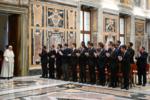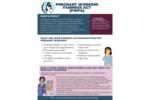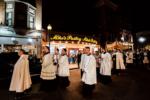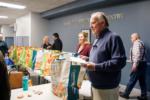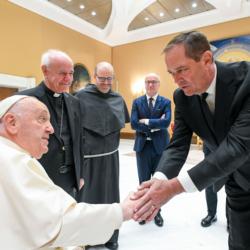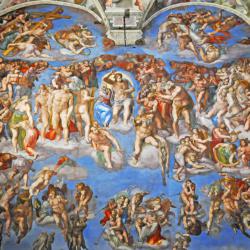Now the real work begins
This weekend English-speaking Catholics throughout the United States who will participate at Sunday Mass will notice that the prayers and responses don't sound the same as they did last weekend. After many years of preparation, the English translation of the third edition of the Roman Missal has finally arrived. You have been reading about it in your parish bulletins and in virtually every other publication printed or posted for Catholic readers. Priests and deacons have been preparing. Musicians have been rehearsing. Catechetical leaders have been teaching. Now it's time to pray with new texts, and the real work begins.
Throughout the Archdiocese of Boston I have had the privilege of meeting hundreds of people who have attended workshops and training sessions on the missal. Most have come with questions and concerns, the biggest one being "Why?" "With all that's going on in the Church and in our world today, why focus on slight changes to the words we pray at Mass?" It's a good question. To answer it, we must go back to the Second Vatican Council, that pivotal moment in the Church's liturgical life. The Eucharist is described as the "source and summit of the Christian life." All the good that we do flows from our encounter with Christ in the Mass. The greatest thing that we do as Catholics is to celebrate the Eucharist. It is our source. It is our summit.
We all belong to a Church whose life spans many centuries. The Church is much older than us, and it will be around after you and I have gone to our eternal reward. Many of the prayers of the Mass come from the earliest centuries of the Church. They have endured thousands of years and they bear repeating because they are beautiful and because of the eternal truths they profess. The new prayers of the Mass help us to remember that we belong to a Church that is much bigger than Boston, much bigger than the United States. We belong to a Church that was founded by Christ and continues to make His Presence known two thousand years later.
Many of us are excited about this weekend and finally having the opportunity to pray with the Roman Missal. Some perhaps are less excited. One anonymous writer recently compared the implementation of this missal to the anxiety provoked by a looming root canal! No one looks forward to a root canal -- but anyone who understands oral hygiene would agree that root canals are always good in the end. The medical procedure goes right to the root of the tooth, treating infection and preventing tooth decay and loss. A root canal, while uncomfortable, is absolutely necessary and good in the end.
The implementation of the Roman Missal may provoke anxiety and discomfort. The initial experience of praying with new words may seem clumsy at first as our mouths become accustomed to new responses printed on a card. I'm sure it will be weeks until we are all saying "and with your spirit" in unison! Despite the initial slip-ups and adjustments, the implementation will be very good in the end. Just as the medical procedure described above treats the roots of our teeth, the new and much-improved translations of the Mass treat the source of our life as Christians. The Mass forms us. It makes us who we are as Christ's disciples and members of His Body, the Church. It is the source and the summit. As much as possible we should strive to celebrate it well.
I was born after the liturgical reforms of the Second Vatican Council took effect, but I can only imagine the excitement and the fear that accompanied those changes. While this weekend's changes are in no way nearly as drastic as those of over forty years ago, they are nonetheless as important. The many workshops and training sessions offered throughout this archdiocese have given me an opportunity to witness the tremendous dedication of thousands, laity and clergy alike. The implementation of the new translation of the missal has generated excitement, and it should. It has been almost forty years since the Church in the United States has devoted so much energy to the Mass. This missal has been a springboard for us all, to eagerly discover ways to improve our celebration of the Eucharist, and to grow in our amazement for this gift from Heaven.
I am grateful for the priests who have assisted me on the archdiocesan level to help our parishes transition to this new Missal: Msgr. Dennis Sheehan, Msgr. James Moroney, Father Brian Mahoney, and Stigmatine Father Gregory Hoppough. I'm also grateful to Mr. Richard Clark and a group of dedicated singers who came together during the summer to produce some of the finest recordings of the music of the Roman Missal, which we've posted on our website and are being used by dioceses around the country. The archdiocesan implementation plan could not have succeeded if it were not for the collaboration of these talented individuals. I am, however, most grateful for the preparation that has been done in the parishes, schools and institutions throughout the archdiocese. Pastors and parish staffs have done a tremendous job of preparing their parishioners and musicians. We have been blessed in Boston with a very good spirit of cooperation and faithful acceptance of these changes, and I pray that this continues to be the case.
What now? The work of translating is done. The task of preparing to receive the new text is accomplished. What remains is indeed the most important piece of this implementation. We must now pray. New words will shape us and form us, just as they have in the past. There's the old saying that goes like this: "What we pray is what we believe." The new words of the Mass aren't really that new, they're not foreign to us. They are what we believe. My deepest hope and prayer is that these words will begin to sound familiar with time. We'll need to reflect on them and in some cases learn the meaning of a few of them. But that's not a bad thing. If it means getting to the root of our faith and discovering again what it is that we believe, and what it is that gives us life, then it's not a bad thing at all.
Father Jonathan Gaspar is the archdiocesan co-director of Worship and Spiritual Life as well as priest-secretary of Cardinal Seán P. O'Malley.
[Editor's Note: For recordings of the music of the missal and for other helpful resources visit the Archdiocesan Roman Missal Page at www.bostoncatholic.org/newromanmissal].



